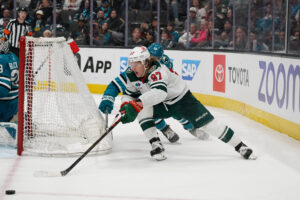A pandemic, closed rinks, closed borders, increasing costs, declining revenues, logistical nightmares, lawsuits, and no path forward. The Canadian Hockey League (CHL) was facing an unprecedented crises before Covid-19. There now may not be a way forward without major change and the loss of teams. The CHL is in crisis mode.
This is the first of a three-part in depth look at the current crisis.
- Why a bailout will be needed.
- Why the money from a bailout might not be able to go towards hockey.
- How playing may worsen the problems.
The ‘C’ Stands for Crisis
The Canadian Hockey League is in crisis. Their financial strength may not be enough to cope with the current situation. Problems include Covid-19, border shutdowns, major lawsuits, social distancing, testing capacity, and culture. If not capably managed, the problems may be too much for the league to have a future.
There are localized aspects to the issues, of course. All teams in the league are unique. However, the problems are essentially the same for the Ontario Hockey League, the Western Hockey League, and the Quebec Major Junior Hockey League. Gate driven hockey leagues facing the prospect of empty buildings and mounting debt. Even a major bailout might not be enough.
Loving Hockey in the Time of Covid
Junior hockey in Canada is in the business of selling tickets. They develop hockey players, and we pay to watch. OHL Commissioner David Branch recently put gate revenues as being the source of 85 percent of total revenue. (Per Mike Stubbs.) In the same article, Branch is quoted as saying the league is planning on “opening up on time.” If the message from the Federal Government about banning the Blue Jays from home games was missed in hockey circles, here’s the bottom line: the pandemic is the priority.
A late September start is not possible with crowds. Camps opening up in late August are the norm, but at this time there is no plan available to ensure safe operations. Normality means exhibition games in early September. This year cannot be normal unfortunately. It is implausible, and would be irresponsible, to open up full capacity stadiums. Remember the Toronto Blue Jays wanted to play in their empty home stadium. Only the wealthiest of teams could possibly do that in the minor hockey world.
In other sports, the CFL is going with a shortened season. The NFL may drop pre-season. The Blue Jays are vagabonds, who may be destined for a 60-game MLB season on the road or Buffalo. In rugby, the Toronto Wolfpack have pulled out of the rest of their year due to the financial demands of continuing. The CHL may have to consider the same. Empty rinks operating on a full hockey schedule is not an option.
Not a Billionaires’ Club
This is not the world of pro sports where billionaire owners buy teams to join a club. Prestige in ownership exists, but it isn’t the old boy’s club of the NHL/MLB/NFL. The exception of course are the Moncton Wildcats who, like everything in New Brunswick, are owned by the Irving family. That’s not the case for most teams. CHL team owners tend to be groups of successful local business people, with a healthy dose of former NHL players. Eating the costs of an unsuccessful year may cause bankruptcies, or large scale sale of ownership.
Disparity will hurt the leagues’ ability to find a solution. Teams in larger places like Ottawa, the Golden Horseshoe, or Vancouver may have ownership groups more capable of weathering financial problems. For example, in 2015, Rick Westhead of TSN pointed to the Kitchener Rangers as being owned by about 4,500 Community Members. In that article on team values, the least valuable team are the Swift Current Broncos. Perhaps those figures can be argued, but the point remains that teams are not financial powerhouses. A Tim Horton’s franchise in some places could be worth more.
Many teams are worth millions. However, they will not be worth operating financially if the total team value is outweighed by what they are asked to eat in expenses this year. Businesses do not operate for long when they lose more money than they are worth. Owners will have to ask if they can continue their involvement.
Small Market Problems
The cultural value to the communities merits a serious look at keeping teams alive. Of course the money matters, but there is more to it. The makeup of the league provides teams across Canada. These clubs are often important to their communities. A positive for the league is that fans are not likely to give up on their teams easily.
A large amount of CHL teams are in exceptionally small markets. Kamloops and Cape Breton have under 100,000 people. Val D’or in Quebec has approximately 30,000 people. There is likely not enough money in those communities to support games in empty arenas. When you factor in the travel costs and issues, the story gets worse for the CHL. Radio and television fees have no hope of bridging the gap. If they cannot sell tickets and raise revenues to counter expenses, many teams won’t be feasible to operate.
Travel: Traditional Problems, Unprecedented Elements
Travelling is the traditional obstacle for the CHL. Canada was built with the promise of a railway to connect the coasts. Distance issues haven’t gone away since. For example, the WHL stretches from the west coast, into Manitoba. Getting teams back and forth across Alberta and Saskatchewan usually means team trips on busses. This issue plays out differently in each city, but it’s a unifying problem for Canadians.
In the time of Covid, the travel issue is much more complex and costly. Social distancing may prove impossible for the CHL. Cramming players onto a bus is irresponsible during a pandemic. This forces expensive solutions.
The access to testing would be central to a healthy season. The league cannot operate their own testing in the way professional leagues do which would create risk. This risk would be carried by players, team staff, and their families.
A normal season would require remarkable change during team travel. Player behaviour on busses has been an issue in the past. It is a challenge for hockey culture to protect people. Safety would mean social distancing, masks, extensive cleaning and testing.
Having players travel across the country in a pandemic is not responsible. Particularly minors. If the CHL plans on a “normal year,” they’ll also be asking people to live away from home. CHL players’ homes include the United States. Canadians at the moment seem content not opening up to the United States. This is not changing soon.
The Way is Closed. You Shall Not Pass
The border is closed and will be for the foreseeable future. This is no small matter for the American based teams. In the UK, British Prime Minister Boris Johnson recently released a plan for “significant normality” by Christmas. They have a plan. In the United States, the goal is to pretend Covid doesn’t exist to keep Trump happy. He’s never happy anyway, but that’s beside the point. The British are looking at the Christmas timeline with a lot of skepticism. If Great Britain does not expect a resolution at that point, a serious person cannot reasonably expect the problem to be over by then in the USA.
This situation changing quickly is not possible. In society or minor hockey, a return to normal is a fantasy akin to expecting the Toronto Maple Leafs to be successful in the playoffs. A majority of Canadians want the border closed until 2021 per a recent CBC poll. Eight CHL teams are based in the USA across four states. At this point, opening after Christmas is overly optimistic.
The Government of Canada has made the position clear. Sports teams, like the New York Yankees, are not going to be travelling here during Covid. They are not going to make an exception for the Portland Winterhawks. With recent events there, asking Canadians to live there for a year is a big request.
The Problems Add Up to Needing a Bailout
Travelling into the USA isn’t an option. The teams located south of the border will not be able to cross repeatedly. American teams may not be able to host Canadian teams at all. Losing all ticket revenue is a blow, paying to be a visiting team all year would threaten eight franchises. With no reasonable ability to project the end of Covid or the Trump era, even the 2020-21 NHL season is in serious jeopardy with a planned January start.
Developmental leagues are in a much worse position. Professional leagues are facing trouble, and for developmental leagues the issues are compounded. The CHL will not have the ability to open before the professional organizations do. They don’t have the means to overcome this without major support. Continuing to operate without income would not be feasible. Like many in these times, they need help. With such bad figures, the business argument for investing is terrible.
Teams Are Important Locally
Realistically, teams require a government bailout. Culturally, hockey is important to a lot of communities. Teams provide a unifying aspects in a community, and in many cases act as anchors in the community. For example, in Guelph the Sleeman Centre is part of a downtown mall. Losing that would be huge.
The cultural argument for supporting the CHL is strong. They are a huge part of the social and economic fabric of communities. In addition, teams allow arenas to operate providing further cultural value. Arenas can be important. For example, they can host art shows, concerts, community events, local leagues, and even operate as treatment centers during an outbreak.
Non hockey events can be held at the same venues which may not otherwise be possible in small communities. After all, people need a place to see Nickleback when their bus rolls into town.
Supporting teams through this current era is a good idea. The CHL has strong importance to Canada, and a bailout would be very possible. If that were to happen and the money was granted, keeping it would be another matter.
Main Photo:






